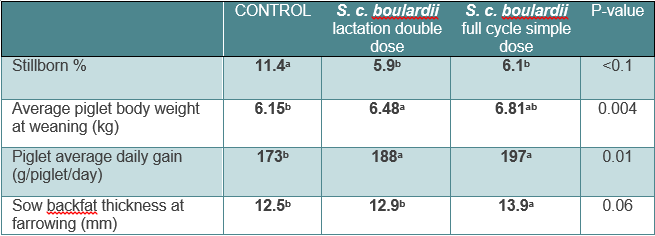News | Reading Time 3 minutes
Probiotic yeast S. c. boulardii enhances the productive performance of hyperprolific sows
Trial results presented at the 52nd Journées de la Recherche Porcine in Paris show how the live yeast Saccharomyces cerevisiae var. boulardii CNCM I-1079 (LEVUCELL SB) benefits high-producing sows when supplemented during the full reproductive cycle. Improved parameters included: stillborn percentage, litter weight at weaning, piglet survival during lactation, and backfat thickness before farrowing. The study also indicated stronger effects for younger sows (at parity 1 and 2). This new study complements previous trials demonstrating the benefits of this specific live yeast to support sow digestive health and feed utilization.
Modern sow management and genetics have optimized production performance through hyperprolificacy. Yet, these advancements generated new issues such as lower piglet vitality and increased incidence of piglet neonatal diarrheas, which are detrimental to piglet health and future growth performance. In this context, keeping a good balance within the sows intestine microbial ecosystem is essential to maintain good body condition and to ensure optimal piglet performance.
A trial was conducted to evaluate the ability of a probiotic live yeast to address some of these concerns. The research was performed in Murcia, Spain, by the Genera PM Office on 148 Danbred sows and compared two supplementation diets against a negative control: either a standard dose of S. c. boulardii CNMC I-1079 during the full gestation and lactation cycle or a double dose only with the lactation diet. The trial started one-week pre-farrowing.
Sows that receive the live yeast probiotic during the full cycle showed the best performance as compared to a higher dose applied only in lactation feed (Figure 1).
Fernando Bravo de Laguna, Research & Development Project Leader, Swine, at Lallemand Animal Nutrition, explains:
“The live yeast S. c. boulardii is proven to act on gut functions at several levels: intestinal microbiota stabilization, gut integrity improvement, and natural defense modulation. These effects can help the sow better respond to peripartum challenges. Better intestinal comfort positively impacts the farrowing process and prepares sows for the lactation phase. It allows them to extract more nutrients from the diet and to ensure optimized milk production, directly reflecting on piglet growth. We assume this global improvement is not a short-term process. The establishment of a positive microbiota and its associated benefits takes time. Our results confirm that long-term supplementation with a standard dose seems to be the best way to apply the probiotic live yeast.”
Published Feb 5, 2020 | Updated May 30, 2023
Related articles
Need specific information?
Talk to an expert